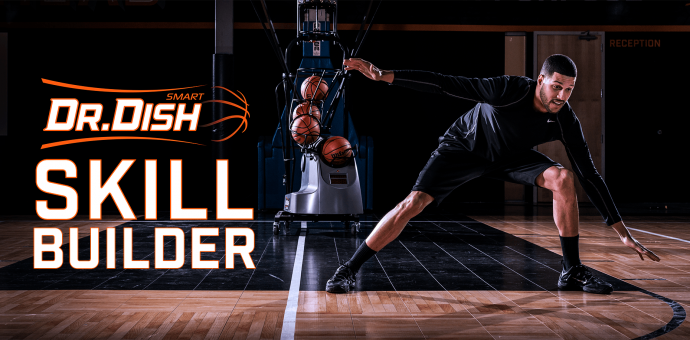Dr. Dish Basketball was fortunate enough to have former NBA player Greg Stiemsma come to the Dish Lab and show us his favorite NBA move!
Greg played collegiate basketball at the University of Wisconsin in the Big Ten Conference and was especially known for his defensive ability and incredible ability to block shots. His effort, skill and desire gave him the opportunity to play for several NBA teams like the Boston Celtics, Minnesota Timberwolves and New Orleans Pelicans.
Greg was able to show his defensive skills at the highest level but also developed some great offensive moves playing against the best in the NBA. One of his favorite moves and also one of the hardest moves for him to guard was the mid/low post retreat, swipe, and attack move. This move is not only a popular NBA move but also a great move for any player at any level who wants to score in the post.
In the video below we used the Dr. Dish All-Star and its swivel net technology to efficiently execute this drill. Watch as Greg himself walks through this move offensively and also defensively. His pro tips on what the offensive and defensive player can do, will bring valuable insight on how and when to use this move.
Coaches: This drill is great for players of any skill level and works on several different important fundamentals. The first part of this move requires the offensive player to square up their defender. Many high school and youth players struggle to get into a triple threat or attacking position when their defender crowds them. The best players learn how to use their shoulders and pivot foot to help create breathing room. Creating space also forces the defender to make a decision on how they want to defend the offensive player which will in turn help the offensive player make the next scoring decision.
After the offense player squares up, the next step is creating space and distance with the retreat dribble. In the mid/low post it’s only necessary to use one or two dribbles on the retreat. The next decision is one of the most crucial parts to this move. Typically the defender will do one of two things. The first would be to sit back and wait for the offensive player to make the next move. Defensively this is the more passive of the two and will force the offensive player to make the right decision. If the defender does this, it’s important for the offensive player to have confidence and knock down the easy mid-range jumper. If the offensive player makes at least one of these shots, it will force the defender to make a decision on sagging back or closing the gap.
Closing the gap is the second defensive option which is the aggressive defensive choice. The defender usually does this to force the offensive player to a certain spot or towards an area of help. Most coaches prefer defenders to be aggressive and force the offensive player into a tough situation but if you are a composed skilled player, this aggression can be used to your benefit. As soon as the defender aggressively closes the gap, the offensive player needs to attack left or right depending on the open gap. This will force the defender to adjust quickly and more times then not this is extremely tough to do. When attacking, it’s essential for the offensive player to “swipe” the defenders arm or shoulder. Make sure not to grab or pull because this would be an offensive foul. This subtle swipe will get your defender off balance and help you turn the corner uncontested. Once the player swipes past the defender there are many scoring options available. In the video above Greg Stiemsma walks through the running hook finish, attacking for the dunk, and also a quick short pull-up shot. Players make sure to have a variety of finishes and lastly understand that help side may be there and there will always be a chance to pass out of this move to create a scoring opportunity for a teammate.







